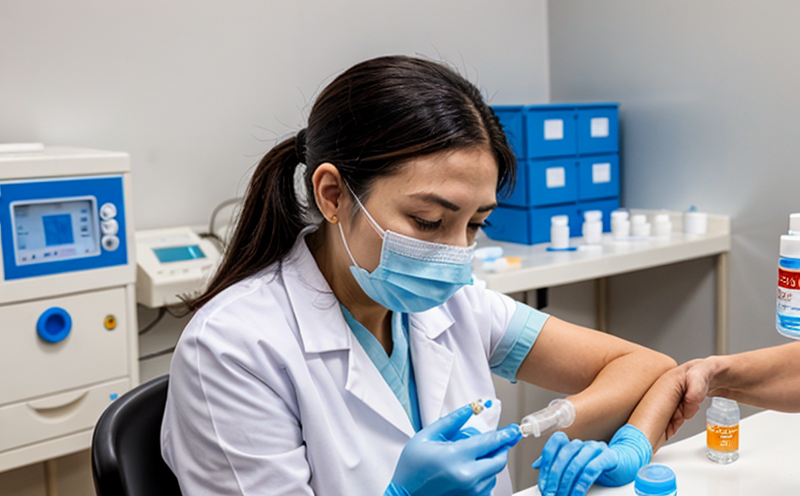EP Freeze Thaw Stability Testing of Vaccines
The European Pharmacopoeia (EP) Freeze Thaw Stability Testing is a critical step in ensuring the quality, safety, and efficacy of vaccines. This testing evaluates how well vaccine formulations withstand repeated freeze-thaw cycles without compromising their stability or potency.
Freeze-thaw stability testing is particularly important for vaccines as they are often administered multiple times over an extended period. Ensuring that a vaccine remains stable through these cycles helps maintain its therapeutic efficacy and reduces the risk of degradation, which could lead to reduced immunogenicity or even complete loss of effectiveness.
The process involves subjecting the vaccine to controlled freeze-thaw conditions, typically cycling between 4°C and -70°C. The aim is to simulate real-world storage and handling conditions that vaccines might encounter during transport and administration. This includes environmental factors such as temperature fluctuations in cold chain logistics or variations in refrigerator temperatures.
During this testing, various physical and chemical parameters are monitored to assess the vaccine's stability. These include but are not limited to:
- Vaccine Potency: Measured through ELISA (Enzyme-Linked Immunosorbent Assay) or similar methods.
- Physical Appearance: Visual inspection for any changes in color, texture, or sediment formation.
- Bioactivity: Determined using assays that measure the vaccine’s ability to elicit a specific immune response.
The European Pharmacopoeia provides detailed guidelines on how this testing should be conducted. These include:
- Reconstitution of the vaccine according to manufacturer instructions.
- Sampling at predefined time points after each freeze-thaw cycle.
- Storage under the specified conditions for a minimum duration of 48 hours.
- Testing and analysis of samples using appropriate methodologies.
The results of this testing are crucial in determining whether a vaccine meets regulatory requirements before it can be marketed. Regulatory bodies like the European Medicines Agency (EMA) or the World Health Organization (WHO) require such stability data as part of their approval processes.
Failure to meet these standards could result in product recalls, delays in market entry, and potential reputational damage for pharmaceutical companies. Therefore, it is imperative that this testing be conducted accurately and consistently across all batches produced by a manufacturer.
Why It Matters
The importance of EP Freeze Thaw Stability Testing cannot be overstated in the pharmaceutical industry. Ensuring that vaccines remain stable through freeze-thaw cycles is essential for several reasons:
- Patient Safety: Stable vaccines ensure consistent efficacy and minimize risks associated with ineffective treatments.
- Regulatory Compliance: Adhering to EP guidelines ensures that products meet international standards, facilitating smoother regulatory approval processes.
- Economic Benefits: Stable vaccines reduce waste due to spoilage or inefficacy, leading to cost savings for manufacturers and healthcare providers alike.
Moreover, the results of this testing play a vital role in determining the shelf life of the vaccine. Accurate stability data allows pharmaceutical companies to set realistic expectations regarding how long a vaccine can be stored before its effectiveness diminishes significantly.
Quality and Reliability Assurance
- Sample Preparation: Samples must be prepared according to the manufacturer's instructions, ensuring consistency across all batches tested.
- Instrumentation: High-precision thermocyclers are used to control and monitor temperature changes during freeze-thaw cycles. These instruments ensure that each cycle adheres precisely to the specified parameters.
- Data Analysis: Statistical tools and software applications are employed to analyze the data collected from stability tests, providing insights into any potential degradation trends or patterns.
The European Pharmacopoeia provides specific acceptance criteria for freeze-thaw stability testing. For instance, the vaccine must maintain at least 90% of its initial potency after the specified number of cycles. Any deviation from this standard may indicate issues with either the formulation itself or how it is being handled during production and storage.
Regular audits by quality assurance teams are conducted to ensure that all tests are performed correctly according to established protocols. This includes checking equipment calibration, verifying sample preparation methods, and reviewing data analysis techniques used in each study.
Competitive Advantage and Market Impact
- Differentiation: Companies that excel at ensuring freeze-thaw stability demonstrate their commitment to product quality, which can differentiate them from competitors in the marketplace.
- Customer Trust: Meeting or exceeding EP guidelines builds trust with regulatory bodies and healthcare providers, enhancing brand reputation and customer confidence.
The ability to consistently produce stable vaccines also contributes significantly to a company's competitive position. It reduces the likelihood of recalls due to product instability, thereby minimizing disruptions in production schedules and maintaining steady supply chains.
Moreover, successful completion of freeze-thaw stability testing can expedite regulatory approvals, allowing for earlier market entry. This translates into faster returns on investment (ROI) for pharmaceutical companies operating within competitive markets where timely access to new treatments is highly valued by both consumers and healthcare systems alike.





